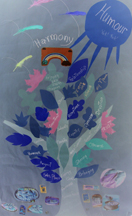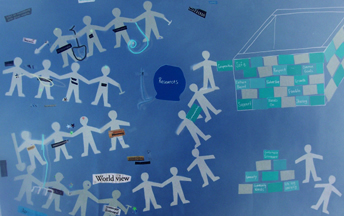The Learning Circles Project |
||
| Summary - Rural by Arthur Bull |
||
The rural profiles presented here are by no means meant to reflect the whole range of learning circles in rural Canada. In fact the examples were chosen from one county in southwestern Nova Scotia. Even though this county, Digby County, does possess an amazing diversity - cultural (Anglophone, Acadian African-Canadian, Mi'kmaq) geographic and economic (fishing farming) - it still comes nowhere near reflecting the diversity of rural Canada. Clearly, it would be impossible using this approach to do justice to the variety of kinds of learning circles there must be across rural Canada. Instead the idea was to gain some insights about rural learning circles by drawing on some local examples. But there some assumptions built in to this approach: that there is such an entity as “rural Canada”, and that we can make any generalizations about this entity in terms of learning circles, or anything else for that matter. In order to put these examples in context it is worth examining our assumptions. “Rural” is not as simple a category as it first appears. Of course we know what we mean when we say “rural”, e.g. people who live in the country. But on closer examination this singular category does not hold up very well. Think of the many different kinds of communities - suburban, small town, northern, remote, Aboriginal and so forth. And think of the different kinds of rural geographical and economic regions: farming, fishing, hunting, and mining. Then there’s the huge cultural diversity of rural Canada - Francophone, Aboriginal, Sikh, Anglophone, Icelandic and so forth. Very quickly the concept of rural Canada comes apart in our hands. So what is it that defines “rural”? Is just the shared popular culture of trucks, guns, ATVs and ball caps and country music? Or is it the sum total of common experiences of everyday rural life: like the common experience of standing at the kitchen window on a winter morning wondering if the roads are fit for driving? Then there are various different versions of rural Canada that are reflected in the media: the nostalgic rural, the unsustainable rural, the backward rural, the neighbourly rural and so forth. None of these stereotypes adequately gets at the vast diverse, complex and rapidly changing places that make up rural Canada today. To be able to generalize about rural Canada, as we do in this project, we have to look beyond these assumptions and stereotypes, to recognize some fundamental realities that are common to rural Canada, and understand how they affect adult learning in groups. In writing the narratives, we identified a few of them. 1) A lot of people know each other. 2) Nature affects people’s lives much more than in the city, economically, socially and culturally. 3) People live farther part; distance of travel is a major factor. Each of these characteristics has an effect on how adult learning circles work in rural settings. “Everyone knows everyone.” In small towns and rural communities there is a very good chance that people know each other. And even if they haven’t met you before, they quite often know about your family background. This fact changes the dynamic of how a group works, as compared to a group where no one has any social relations outside the group. It also has implications for literacy programming, relating to the still-present stigma of “illiteracy”. This makes the issue inclusion very important in rural learning circles. Distance. Travel is always a major factor. The lack public transportation, the cost of transportation, especially with rising gas prices, and the long distances to be traveled all add up to major barrier for many rural Canadians. This is a constant factor that has to be dealt with in rural learning groups, an ever present potential barrier to participation. And even if those barriers are addressed, many meetings still have to be cancelled in the winter months because of bad road conditions. Nature. Beyond the obvious realties of living in a natural setting - beautiful scenery, icy roads and hunting - it is important to remember that the economies of rural communities are usually dependent on natural resources like fishing, mining and forestry. In farming communities, natural conditions have an immediate and dramatic effect on livelihoods. This is truer than ever in the age of global warming. Across Canada many local economies are being radically affected by the rapid industrial extraction of natural resources. In addition to these three basic factors, the rural narratives pointed to a couple of other aspects of adult learning that are unique to rural communities: ongoing traditions of adult learning and the role of women in adult learning groups. Traditions of Rural Adult Learning. Rural communities have a long history of adult learning. In Nova Scotia this goes back to the Coady Institute. Across Canada, the Women’s Institutes and other groups have along history of supporting informal adult learning in rural communities. The Role of Women in Rural Learning. The Women’s Institutes example also shows that women have long had an important role in rural adult learning. This takes in a vast array of learning opportunities form rug hooking to community economic development. These aspects of rural learning circles have implications about how we can support learning circles. Travel. Financial assistance with travel is essential for rural learning circles. Inclusion. It is important to work to find ways of including adults with lower literacy skills in a broad range of rural activities. Link to Natural Resources. It is important to support rural learning circles that focus no the struggles and aspirations of rural Canadian, in relation to the extraction and management of natural resources. Existing networks and organizations. It is important support existing support networks and established traditions of adult learning in rural communities. |
||

